
PALS
The 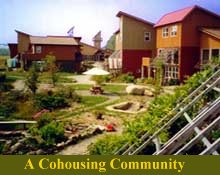 Third Blessing is a dominion
of love where everyone lives as one huge family. A family takes care of the weak. A family
is sensitive to the individual. The UC needs to create deep love between the members as
friends who will die for each other. This will only happen when members live close
together in trinities and groups of trinities. UC members in America haven't lived in
trinities because there was no stability. Everything was so mobile no one could get roots
and form a community. We have been like gypsies camped outside town. Now it's time to go
into Canaan and build a stronger community than others. It's
time to sink roots, instead of pulling them up. One of the curses of the UC and 20th
century America has been it mobility. The good side was that travel can help a person to
not get provincial and open up to other types of people. The negatives far outweigh the
positives in losing extended families and communities. For most people the grass wasn't greener on the other hill. Robert Nisbet in Twilight of
Authority says that America gave up its focus on local community and even disparaged
it in the 1920s. This is the trend I have written of in this book how America threw out so
many good things from the Victorians. Nisbet says, "World
War I is, I think, the sharp dividing line. Afterward interest in local community did not
attain its earlier intensity, flavor, and eloquence. The influence of
Third Blessing is a dominion
of love where everyone lives as one huge family. A family takes care of the weak. A family
is sensitive to the individual. The UC needs to create deep love between the members as
friends who will die for each other. This will only happen when members live close
together in trinities and groups of trinities. UC members in America haven't lived in
trinities because there was no stability. Everything was so mobile no one could get roots
and form a community. We have been like gypsies camped outside town. Now it's time to go
into Canaan and build a stronger community than others. It's
time to sink roots, instead of pulling them up. One of the curses of the UC and 20th
century America has been it mobility. The good side was that travel can help a person to
not get provincial and open up to other types of people. The negatives far outweigh the
positives in losing extended families and communities. For most people the grass wasn't greener on the other hill. Robert Nisbet in Twilight of
Authority says that America gave up its focus on local community and even disparaged
it in the 1920s. This is the trend I have written of in this book how America threw out so
many good things from the Victorians. Nisbet says, "World
War I is, I think, the sharp dividing line. Afterward interest in local community did not
attain its earlier intensity, flavor, and eloquence. The influence of  Woodrow Wilson and his New Freedom in this
country and of Lenin in European radical thought had a great deal to do with turning
revolutionary and progressive thought away from its concern with locality or, for that
matter, any of the smaller unities. The nation, the centralized nation freed of local
community became the symbol of reaction, dullness, mediocrity, and oppression of mind.
Sinclair Lewis's Main Street, Babbitt, and other
novels were only the most popular of a literature in the 1920's that satirized,
caricatured, and pilloried the village or small town. And such rendering of local roots
was in keeping with the increasing nationalism to be seen in the social sciences, in
education, and in government policy from World War I on."
Woodrow Wilson and his New Freedom in this
country and of Lenin in European radical thought had a great deal to do with turning
revolutionary and progressive thought away from its concern with locality or, for that
matter, any of the smaller unities. The nation, the centralized nation freed of local
community became the symbol of reaction, dullness, mediocrity, and oppression of mind.
Sinclair Lewis's Main Street, Babbitt, and other
novels were only the most popular of a literature in the 1920's that satirized,
caricatured, and pilloried the village or small town. And such rendering of local roots
was in keeping with the increasing nationalism to be seen in the social sciences, in
education, and in government policy from World War I on."
One of the great losses of the migration to the city was loss of love for nature.
Many people take care of their yard and do some gardening, but people need more than that
to nurture their spirit. Stressful two week vacations to national parks is not enough. The
UC should live in communities that have some acreage for adults to walk. The Victorians
would go on walks. Children need to run. And dogs need space too. We need to get back to
the rhythm of small communities where people know and care for each other. Some of my
greatest memories are time I spent on my grandparent's farm
eating an organic juicy peach right off the tree, gathering eggs, riding a horse, playing
in the barn, hunting for squirrels and rabbits as I walked along a stream. It is magic to
wake up to the sights and sounds of nature and a 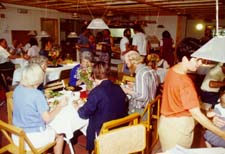 loving community. Just play with the numbers. To make it simple,
lets use the number 10 for the size of each UC family -- a
number less than Father talks of. If you had that many children, either by yourself or by
adopting, and each of them had 10 children, you would have 100 grandchildren. The next
generation would be 1000, then 10,000, then 100,000 then one million. Within a few
generations one couple could have a large city of just their descendants. If every UC
couple had more than 10 children and I assume many would want to adopt from third world
countries, just think of the joy it would bring to God to save those children and to see
His family become the most powerful and exciting group on earth. The UC needs to start
building cities with lots of green space that supply most of the food locally. This will
end the terrible erosion and use of chemicals that agribusiness uses because it thinks it
has to use to make a profit.
loving community. Just play with the numbers. To make it simple,
lets use the number 10 for the size of each UC family -- a
number less than Father talks of. If you had that many children, either by yourself or by
adopting, and each of them had 10 children, you would have 100 grandchildren. The next
generation would be 1000, then 10,000, then 100,000 then one million. Within a few
generations one couple could have a large city of just their descendants. If every UC
couple had more than 10 children and I assume many would want to adopt from third world
countries, just think of the joy it would bring to God to save those children and to see
His family become the most powerful and exciting group on earth. The UC needs to start
building cities with lots of green space that supply most of the food locally. This will
end the terrible erosion and use of chemicals that agribusiness uses because it thinks it
has to use to make a profit.
M. Scott Peck said, "In and through community lies the salvation of the
world." More and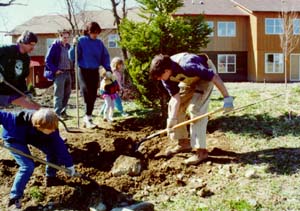 more
people are beginning to realize that life is better in a community. There are more and
more books on the subject. Carolyn Shaffer writes in Creating Community Anywhere:
"Only two or three generations ago, community was a fact of life for most people.
Neighbors left their doors open, helped each other build things, and kept an eye out for
one another's well-being. In 1930, less than eight percent of American households
consisted of a single person, and many families occupied the same house for
generations."
more
people are beginning to realize that life is better in a community. There are more and
more books on the subject. Carolyn Shaffer writes in Creating Community Anywhere:
"Only two or three generations ago, community was a fact of life for most people.
Neighbors left their doors open, helped each other build things, and kept an eye out for
one another's well-being. In 1930, less than eight percent of American households
consisted of a single person, and many families occupied the same house for
generations."
"Today, almost a quarter of U.S. households consist
of people living alone. Doors, literally and figuratively, are closed and locked to keep
out crime and strangers. Americans move so frequently that direct mail marketers consider
a two-year-old mailing list hopelessly out of date; more than thirty percent of the
addresses will have changed in that time. More and more women, who used to be the
caretakers of community while the men pursued 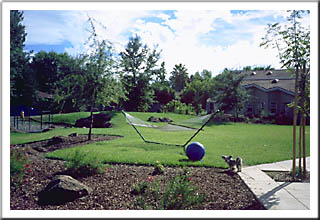 opportunities in the larger world, now find it necessary to work
outside the home as well. Neither women nor men feel they have much time to maintain the
ties of mutual support. It is commonplace for families as well as singles to have little
or no contact with others who live only a door or two away."
opportunities in the larger world, now find it necessary to work
outside the home as well. Neither women nor men feel they have much time to maintain the
ties of mutual support. It is commonplace for families as well as singles to have little
or no contact with others who live only a door or two away."
"Earlier generations relied upon family and community
for different functions than people do today. Not that many decades ago, relatives and
neighbors helped each other give birth at homes and eventually die there. They nursed one
another to health, took in orphaned children of brothers and sisters who died young, and
gave up personal ambitions to carry on the family business or to care for an aging parent.
Today, institutions and professionals have taken over many of these roles. People go to
hospitals, schools, and nursing homes to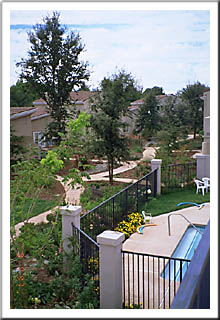 receive health care and education."
receive health care and education."
George Will wrote, "Clearly this nation, though steeped in the severe individualism of the frontier notion of freedom, has a yearning for the community feeling that comes from collective undertakings...The question is whether any enterprise other than war can tap that yearning." Father's war against Satan and his dream of the whole world being blessed and living in condominiums will accomplish this.
Robert Nisbet wrote, "The towering moral problem of the age [is] the problem of community lost and community regained." Walt Whitman wrote:
I dream'd in a dream I saw
a city
invincible to the attacks
of the whole rest of the
earth.
I dream'd that was the new city
of Friends.
Community spirit
Shaffer  writes how businesses are
seeing that they need a community spirit: "At the Quaker Oats pet food plant in
Topeka, one production worker's performance deteriorated until he finally made a serious
mistake that would have caused some companies to fire him. Instead, three fellow members
of his work team began counseling and working with him on a weekly basis until his
performance was up to par."
writes how businesses are
seeing that they need a community spirit: "At the Quaker Oats pet food plant in
Topeka, one production worker's performance deteriorated until he finally made a serious
mistake that would have caused some companies to fire him. Instead, three fellow members
of his work team began counseling and working with him on a weekly basis until his
performance was up to par."
"The founder of Harbor Sweets, a Massachusetts candy company, insists that his diverse work force operates on total trust, with no time clocks, no efficiency measures, and no secrets. Productivity is high because, he says, 'love is good business.'"
"I know this is going to sound sort of hokey, but I work here because of the family feeling.' says a manager at Levi Strauss & Company in San Francisco. After twenty-two years with the company, he cannot imagine leaving."
Tom Peters says, "Those few American corporations that manage to convey a genuine sense of community and belonging to their employees are thriving as a consequence." Max DePree says, "In most vital organizations, there is a common bond of interdependence, mutual interest, interlocking contributions, and simple joy." Shaffer writes, "The ultimate employee-based structure is the employee-owned company, in which people are literally invested in the firm. More than 11,000 American firms have some sort of employee stock ownership plan (ESOP), and many also involve employees in running the organization."
Government, businesses, churches and all organizations have a hierarchy. God's way
is to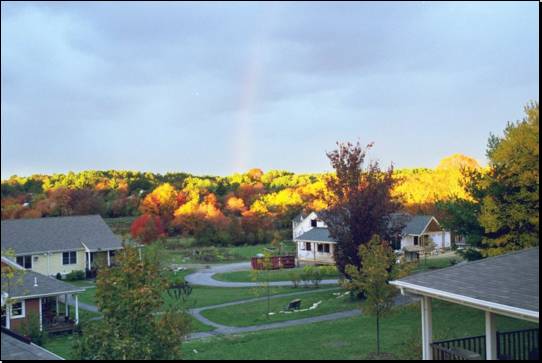 diffuse power, not centralize it. If
organizations from the family level to huge corporations and governments do not empower
those at the bottom, they will fail. The ultimate example is the former Soviet Union and
todays North Korea. They are examples of people who can't even feed themselves, let alone
compete with their neighbors. Men in leadership positions such as husbands, CEOs or the
President of the United States should not be dictatorial, but raise others to be leaders,
to allow for mistakes, to encourage creativity, to be friends with their coworkers. Father
says that when children grow up they are friends to their parents. Elders must be
respected but elders must also respect those under them. True leaders raise people to take
their position so they can go on to other things. Leaders have to make final decisions
sometimes, but they do so after listening respectfully to others. Mainly, he delegates
power and is a teacher and coach. The majority doesn't necessarily rule, but they must
feel they are listened to and respected. The focus is on getting the job done, not titles.
Warren Bennis writes, "An organization should, by definition, function organically,
which means that its purposes should determine its structure, rather than the other way
around, and that it should function as a community rather than a hierarchy, and offer
autonomy to its members, along with tests, opportunities, and rewards, because ultimately
an organization is merely the means, not the end."
diffuse power, not centralize it. If
organizations from the family level to huge corporations and governments do not empower
those at the bottom, they will fail. The ultimate example is the former Soviet Union and
todays North Korea. They are examples of people who can't even feed themselves, let alone
compete with their neighbors. Men in leadership positions such as husbands, CEOs or the
President of the United States should not be dictatorial, but raise others to be leaders,
to allow for mistakes, to encourage creativity, to be friends with their coworkers. Father
says that when children grow up they are friends to their parents. Elders must be
respected but elders must also respect those under them. True leaders raise people to take
their position so they can go on to other things. Leaders have to make final decisions
sometimes, but they do so after listening respectfully to others. Mainly, he delegates
power and is a teacher and coach. The majority doesn't necessarily rule, but they must
feel they are listened to and respected. The focus is on getting the job done, not titles.
Warren Bennis writes, "An organization should, by definition, function organically,
which means that its purposes should determine its structure, rather than the other way
around, and that it should function as a community rather than a hierarchy, and offer
autonomy to its members, along with tests, opportunities, and rewards, because ultimately
an organization is merely the means, not the end."
The  primary community is the
family. Parents are supposed to be living with their adult children as extended families.
We need to return to the way our ancestors lived. And we need to go forward by living with
others of the same faith in condominiums as Father commands us. The way Americans live now
is ridiculous and tragic. In Cohousing the authors write, "In previous
centuries, households were made up of at least six people. In addition to having many
children, families often shared their homes with boarders, relatives, or servants.
Relatives usually lived nearby. These large households provided both children and adults
with a diverse intergenerational network of relationships in the home. The idea that the
nuclear family should live on its own without the support and assistance of the extended
family or surrounding community is relatively new, even in the United States."
primary community is the
family. Parents are supposed to be living with their adult children as extended families.
We need to return to the way our ancestors lived. And we need to go forward by living with
others of the same faith in condominiums as Father commands us. The way Americans live now
is ridiculous and tragic. In Cohousing the authors write, "In previous
centuries, households were made up of at least six people. In addition to having many
children, families often shared their homes with boarders, relatives, or servants.
Relatives usually lived nearby. These large households provided both children and adults
with a diverse intergenerational network of relationships in the home. The idea that the
nuclear family should live on its own without the support and assistance of the extended
family or surrounding community is relatively new, even in the United States."
Let's grow geometically
I think that every blessed couple should have at least twelve children. Many women may not want to physically have that many and some may want to but can't. Therefore, each couple should save some of the millions of street kids around the world by bringing them into their homes. We should begin the process of settling down and making roots. Let's say each family had an average of six boys and six girls. Most, if not all the boys, should stay together. Their wives form a school to homeschool the children. If each of the six boys has twelve children then there will be 72 children. The boys build businesses and attract others to live in their community. Pretty soon there would be enough to have a city. With so many people in a few generations they would have their own hospital and theme park. There would be farms to feed everyone and food left over to give to the poor. These communities will inspire the world. Since most of the girls will follow their husbands, they will encourage them to build similar communities. Her six brothers will give money and visit her where she lives to help build a community around her family.
It should be an exception to the rule that boys leave their parents and go live somewhere else. Just think how much less tragedy there would have been in human history if men had lived as trinities. Millions of men have had to fight wars, millions have had to leave to pursue some dream, millions have got sick and countless millions have died leaving women alone to fend for themselves. Recently I watched a video series on the pioneers who came on the Oregon Trail. The suffering of mankind has been indescribable. In one scene the narrator read a passage of a diary of a woman who told of how a few men, including her husband, had gone out to hunt for some animal for supper, and one of the men had an accident and died. When she was told this the woman described in her diary the grief, suffering and terror this woman went through and how terrifying her life had become as she had to go on with her children in the brutal trail that lay ahead. What if there were a trinity? She would have had two men to take care of her.
Sometimes 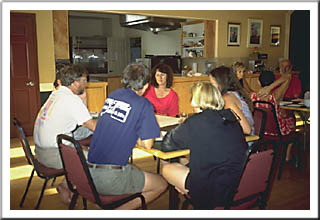 I watch shows of charitable
organizations that ask you for twenty dollars a month to care for a child in a third world
country. I'll never forget one in particular. The famous TV star, Alex Trebek, was in
Bogota, Columbia. In one scene he was surrounded by a dozen boys. It was at night. He said
these boys are street kids who have nothing. He then shined a light on a bunch of boys,
many just 6 or 7 years old who were all asleep and huddled together. He said he had a coat
on and he still felt chilled. The children were in thin rags. You can't help but cry.
Let's get these kids into our homes and be their parents. Let's get our kids to do the
same. We should work with governments to make it easier to get these kids adopted by
families around the world. I met a man recently who was in the navy and he saw in Korea a
orphanage run by Catholic nuns. Outside the house there was a small fence going clear
around the house. During the night people would give their babies away by putting them in
this area. In the morning the nuns would come out and gather up the babies and take them
in. Let's get those babies into our homes.
I watch shows of charitable
organizations that ask you for twenty dollars a month to care for a child in a third world
country. I'll never forget one in particular. The famous TV star, Alex Trebek, was in
Bogota, Columbia. In one scene he was surrounded by a dozen boys. It was at night. He said
these boys are street kids who have nothing. He then shined a light on a bunch of boys,
many just 6 or 7 years old who were all asleep and huddled together. He said he had a coat
on and he still felt chilled. The children were in thin rags. You can't help but cry.
Let's get these kids into our homes and be their parents. Let's get our kids to do the
same. We should work with governments to make it easier to get these kids adopted by
families around the world. I met a man recently who was in the navy and he saw in Korea a
orphanage run by Catholic nuns. Outside the house there was a small fence going clear
around the house. During the night people would give their babies away by putting them in
this area. In the morning the nuns would come out and gather up the babies and take them
in. Let's get those babies into our homes.
The UC is living as isolated nuclear families in single family dwellings. Before, they lived in communes. Neither one is God's architecture. Formation stage was communes; growth stage is individual homes; completion stage is living together in communities. Stephen Covey in 7 Habits of Highly Effective People divides people's growth into three stages: dependent (to me this would be living in communes), independent (isolated nuclear families), and interdependent (communities).
Father says we cannot grow alone. He has always lived with others in a community. He said, "You cannot go the way of faith alone. You need a like-minded friend in faith. More than three people should be one. That's why a trinity is needed." He explains that God teaches us through others, "God cannot teach human beings directly when they make mistakes. He cannot teach us vertically. But if three people become one, when one makes a mistake and the other two don't, He can instruct the mistaken one about what he did wrong."
Satan isolates people, like he did Eve, and then overpowers them. The 19th century often lived as extended families and in small communities. When the pioneers went west they went as a group of wagon trains. The twentieth century is isolated nuclear families that are as vulnerable as a single wagon crossing hostile Indian territory. It was better a hundred years ago when there were extended families so men could talk over decisions with fathers, brothers, cousins, etc. Many women hate patriarchy today because their husband is alone and makes a lot of mistakes. They don't read any instruction manuals for marriage. The culture overwhelms them with temptations of women who are everywhere, especially at work. He is tempted by Satan's lie of instant gratification with greasy, artery blocking fast food and car dealer's ads for loans and so-called conservative bankers who flood the mails with credit cards. Everything is so impersonal. Investments are mutual funds that are so impersonal they don't mean anything. The warm neighborhood spirit of small town barn-raisings and quilting bees is gone. Thousands of people came to the UC in the 70s and left because they felt alone. The UC needs to create an atmosphere of friendship.
Because men lead, Father says men especially must be united: "Especially the three men should be united, spiritually and physically." They must be so close and pure that each one would take care of the other family if one should die: "When one husband dies, the trinity should be responsible for the household of his family. From now on, we are to manage three households together; we are not to live alone. ... Consider Father's words as life itself. Be absolutely obedient. ... The trinity should feel the same even if they exchange their babies. If you feel troubled about this, you will fail. Don't worry if a husband of one family in the trinity dies. In that case, the remaining two families should be responsible." This is Completed Testament Age living. This is Father's new paradigm for the family. We're not eliminating patriarchy, but making it work perfectly. Satan cannot dominate a man and make him evil or incompetent in this ultimate insurance plan. Now men rely on distant, impersonal life insurance companies to protect their families, but God's way is personal, intimate and safe.
Children need other men nearby to see different aspects of God's masculinity and to see femininity in other women. If someone gets sick then there are others to help. In the Christian men's organization, Promise Keepers, a man wrote these similar thoughts in their magazine: "Too many men today are trying to go it alone in terms of their marriage and family life, their personal life, their work and their spiritual commitments. They are trying to scale mountains of Himalayan proportions solely on the strength of rugged independence. It won't work." He gives an analogy of a group of men scaling a mountain: "If a guy is linked to another guy above him, and that man in turn is linked to other men farther up the cliff, then together they have safety, stability and strength. If a man slips and begins to fall, 15 or 20 climbers absorb the impact and pull him back from disaster. But imagine a man climbing alone, with no support system. He may achieve great heights. But one wrong move, and he can fall thousands of feet to his death, without so much as anyone hearing his cry. That's why Scripture says, 'Two are better than one because they have a good return for their labor. For if either of them falls, the one will lift up his companion. But woe to the one who falls when there is not another to lift him up' (Eccl.4:9-10)." There is strength in numbers.
The following is from a seminar I attended on leadership in effective organizations:
Lessons from Geese
 1.
As each bird flaps its wings, it creates an uplift for others behind it. There is 71% more
flying range in a v-formation than flying alone.
1.
As each bird flaps its wings, it creates an uplift for others behind it. There is 71% more
flying range in a v-formation than flying alone.
LESSON: People who share a common direction and sense of common purpose can get there quicker.
2. Whenever a goose flies out of formation it quickly feels the drag and tries to get back into position.
LESSON: It's harder to do something alone than together.
3. When the lead goose gets tired, it rotates into the formation and another goose
flies at the head.
the head.
LESSON: Shared leadership and interdependence gives us each a chance to lead as well as opportunities to rest.
4. The geese in formation honk from behind to encourage those up front to keep up their speed.
 LESSON:
We need to make sure our honking is encouraging and not discouraging.
LESSON:
We need to make sure our honking is encouraging and not discouraging.
5. When a goose gets sick or wounded and falls, two geese fall out and stay with it until it revives or dies. Then they catch up or join another flock.
LESSON: Stand by your colleagues in difficult times as well as in good.
Father says women must overcome their selfish desire to live away from others:
"Women are
capricious, aren't they? ... Women want to live only with their spouses, right? Unless we
destroy this standard, world unity is impossible. You have to understand this point. ...
The three wives of a trinity should be one, so Father disciplines you right now to become
one." Father goes on to say that 12 families should live together, then 1,200. We are
to "live in the same village." There's a saying, "It takes a village to
raise a child." Father says there must not be any fighting. If there is then "a
tribal conference should be held to punish the ones who fight."
are
capricious, aren't they? ... Women want to live only with their spouses, right? Unless we
destroy this standard, world unity is impossible. You have to understand this point. ...
The three wives of a trinity should be one, so Father disciplines you right now to become
one." Father goes on to say that 12 families should live together, then 1,200. We are
to "live in the same village." There's a saying, "It takes a village to
raise a child." Father says there must not be any fighting. If there is then "a
tribal conference should be held to punish the ones who fight."
Michael Craig's vision
Father talks often of extended families. It is not God's way for parents to live alone or in nursing homes. Father often talks of old people being close to God. He says God is old! The advantages of living with others are endless. One brother had a vision of a house with four families living together and sharing a dining room. In the May, 1995 UNews Michael Craig wrote an article called "Garden Homes: A New Approach to Housing Ourselves." He wrote that "it would be impossible to succeed in our collective mission unless we pulled together" but unfortunately there is no "consensus on how this could be accomplished." The members in Detroit only met "on Sundays and special occasions. As each family became involved in the struggle to feed, clothe and shelter themselves, there was little time and energy left to promote a significant transformation of our collective social environment. In this regard, the concept 'where two or more are gathered' took on a new meaning for me. Single families existing miles apart would never succeed in bringing about the kind of radical change implied by True Parent's tradition. However, a physical community (minimum of four families) could perhaps generate enough 'critical mass' to tilt the scales."
This sure sounds great to me. Let's do it. The problem of course is that these couples must love each other. Families could begin the process by visiting each other's house and have potluck. Over time, if they gel then they can get the finances and commitment to live together. This brother's "vision" was families eating together in a community dining room and having room for gardens. He says there would be great savings and mutual aid by having "cooperation in food buying, babysitting, and a hundred other details of everyday life. There could be co-sharing of big ticket items such as lawnmowers, power tools, etc., as well. It is easy to imagine parents (and older children) having weekly meetings in the community dining area (perhaps over dinner) to discuss ways to cooperate to further reduce the economic burden of raising families. This would free each to devote more time to witnessing and teaching."
![]()
